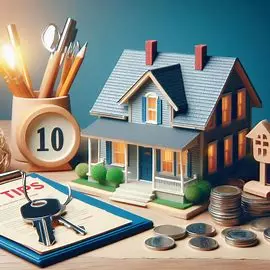How to Price Your Home Right

Pricing Your Home for Success in Indiana's Real Estate Market
Pricing your home correctly is one of the most crucial steps in the selling process. In Indiana's dynamic real estate market, understanding how to set the right price can make all the difference between a quick sale and a property that lingers on the market for months. Here's a comprehensive guide to help sellers navigate pricing strategies effectively.
Understanding the Market
Before you even consider a price for your home, it's essential to understand the current real estate landscape in Indiana. The market can vary significantly from one city or neighborhood to another. For instance, urban areas like Indianapolis may have different pricing trends compared to more rural regions.
Research recent sales in your area, focusing on homes that are similar in size, condition, and features. This will give you a clearer picture of what buyers are willing to pay. Websites like Zillow or Realtor.com can provide valuable insights into recent sales and current listings.
The Importance of Comparative Market Analysis (CMA)
A Comparative Market Analysis (CMA) is an invaluable tool when determining your home's value. A CMA takes into account properties that have recently sold, are currently on the market, and those that were listed but did not sell. By analyzing this data, you can get a sense of where your home fits within the local market.
When conducting a CMA, pay attention to:
- Location: Neighborhoods can greatly influence property values.
- Size: Compare homes with similar square footage.
- Condition: Homes that have been updated or well-maintained often command higher prices.
- Features: Unique features such as pools, finished basements, or energy-efficient upgrades should also be considered.
Consult with Real Estate Professionals
Engaging a local real estate agent can provide invaluable expertise in pricing your home correctly. Agents have access to extensive market data and can offer insights that you may not find on public platforms. They can also help identify any unique selling points about your property that could justify a higher price.
A good agent will conduct their own CMA and may suggest a range of prices based on their experience and knowledge of buyer behavior in Indiana's specific neighborhoods.
Consider Your Home's Condition
The condition of your home plays a significant role in its marketability and pricing. Homes that require significant repairs or updates may need to be priced lower than comparable properties that are move-in ready.
If you want to maximize your selling price, consider investing in minor renovations or staging your home before listing it. Simple updates like fresh paint, landscaping improvements, or modernizing fixtures can enhance appeal and justify a higher asking price.
Be Mindful of Buyer Psychology
Understanding buyer psychology is crucial when pricing your home. Many buyers tend to perceive homes priced just below round numbers (e.g., $249,900 instead of $250,000) as more attractive. This strategy can create more interest and potentially lead to multiple offers.
Additionally, consider how long you want your home on the market. If you're looking for a quick sale, pricing slightly below market value might attract more buyers quickly.
Seasonal Trends
Indiana experiences seasonal fluctuations in its real estate market. Typically, spring and summer see an uptick in activity as families prefer to move during school breaks. Conversely, fall and winter months may slow down sales but could also present opportunities if there's less competition.
Timing your listing appropriately can influence how you price your home as well. If you're listing during peak season, you might be able to ask for more; however, if you're selling during off-peak times, adjusting your expectations may be necessary.
Flexibility is Key
Once you've set an initial price for your home based on research and professional advice, remain flexible. If you don't receive any interest after a few weeks or if feedback suggests that potential buyers find the price too high, be prepared to adjust accordingly.
Consider setting an expiration date on your listing price strategy—if no offers come through within a specific timeframe (e.g., 30 days), reassess based on feedback from showings or consultations with your agent.
Conclusion
Pricing your home right in Indiana's competitive real estate market requires careful consideration of various factors. By taking these steps seriously and remaining adaptable throughout the process, you'll position yourself for success in selling your home efficiently and at an optimal price point. Remember: the right price attracts buyers; it's all about striking that perfect balance!
Categories
Recent Posts









